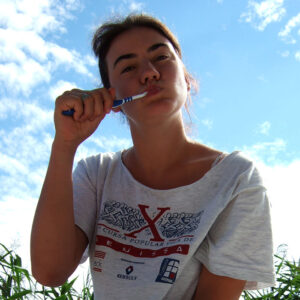Common Toothbrush Mistakes To Avoid
August 26th, 2019

MAINTAINING GOOD DENTAL health isn’t just about the quantity of your brushing — it’s also about the quality. There are several mistakes many of us make when brushing our teeth, whether because we’re using the wrong tools or because we’re using the right tools the wrong way.
1. Keeping A Toothbrush Too Long
How long has it been since you got a new toothbrush? The American Dental Association recommends replacing your toothbrush at least three times a year, because broken, frayed bristles can’t do as good of a job of keeping your teeth clean.
2. Racing Through Your Brushing
The average time people spend brushing their teeth is 45 seconds, which obviously falls far short of the full two minutes recommended. If you’re having trouble making it through two whole minutes, try setting a timer or playing a song.
3. Brushing Too Hard
You might assume that the harder you brush, the cleaner your teeth will get, but you really only need gentle pressure to scrub the leftover food and bacteria away. If you brush much harder than that, you risk damaging your gum tissue.
4. Using A Hard-Bristled Brush
Like brushing too hard, using a toothbrush with hard bristles can do more harm than good, especially to gum tissue. Talk to us if you’re not sure which type of bristles your toothbrush should have.
5. Brushing Immediately After Eating
A common mistake people make when they’re trying to take good care of their teeth is to immediately brush them after a meal. Acidic foods and drinks temporarily weaken our tooth enamel, and brushing right away can cause damage. This is why we should wait at least half an hour to brush so that our saliva has time to neutralize things.
6. Poor Toothbrush Storage
Is your toothbrush smelly? Do you store it somewhere it can get plenty of air, or do you put it in a case where it never really dries out? Bacteria love moist environments, so the best thing we can do to keep our toothbrushes clean is to store them upright somewhere they can air dry between uses.
7. Bad Brushing Technique
Even brushing for two full minutes twice a day with the best toothbrush with the perfect bristle firmness won’t do much for your teeth if your technique is off. Remember that you’re brushing to get plaque and food particles out of the gumline, so hold your brush at a 45° angle to the gums and gently sweep the bristles in small circular motions. Do this at least 15 times in each area of the mouth, on the tongue side and outside of the teeth, and don’t forget the chewing surfaces!
Come To Us With Your Tooth Brushing Questions
If you want to learn more about good brushing technique, too26thbrush storage, or how to pick the perfect toothbrush for you, just give us a call! We want to make sure that all of our patients have the right tools and knowledge to keep their teeth healthy for life!





 Website Powered by Sesame 24-7™
Website Powered by Sesame 24-7™
